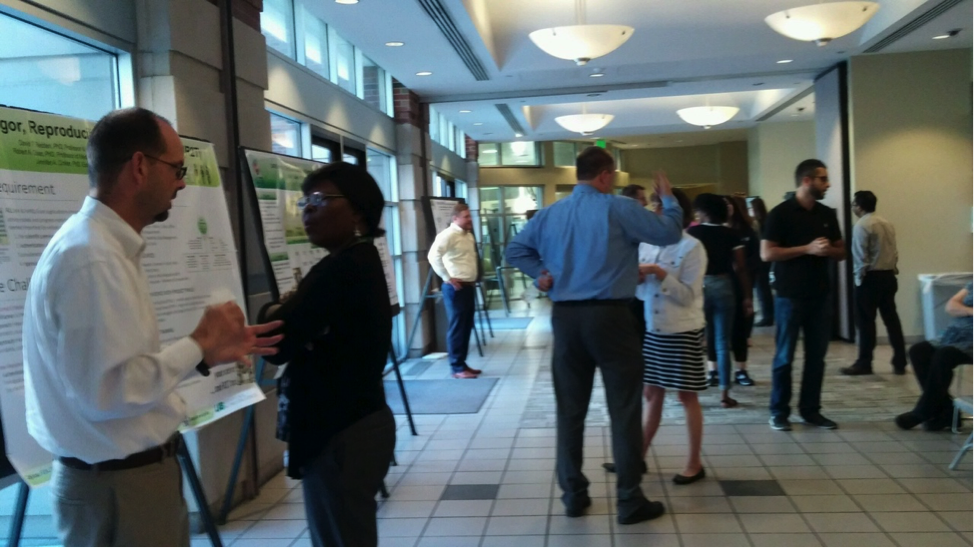Upcoming CCTS Events

SHRINE stands for the Shared Health Research Information Network. As a participating institution in the Southeastern (SE) SHRINE Consortium, the CCTS is collaborating with four other CTSAs, including Emory, University of Arkansas for Medical Sciences (UAMS), University of Kentucky (UKY) and Medical University of South Carolina (MUSC), to share federated health data within the group. All partnering institutions bring strong experience in the use and extension of i2b2, a scalable informatics framework designed for translational research. The i2b2 tool enables the sharing of aggregated data, meaning patient identity is protected.
In general, SHRINE seeks to support hypothesis development, clinical trial feasibility testing and recruitment, comparative effectiveness research, and population health research and services. The SE SHRINE Consortium members are working together to develop the infrastructure to support these ambitious goals regionally.
Representatives from the SE SHRINE institutions recently met in Little Rock, AR, to discuss progress on their shared agenda, which includes:
- Developing and maintaining i2b2/SHRINE instances that share a common SHRINE ontology and a TriNetX subnetwork that includes diagnoses, procedures, medications, and lab data and provides live data querying capabilities
- Developing a shared governance model for accessing data from the SE SHRINE network
- Adopting the SMART IRB protocol to enable multisite projects
- Mutually advancing work on research permissions for access to data and tissues within the participating EHRs
- Mutually advancing work on sharing clinical phenotypes from the EHR data in computable form across the network
- Preparing SE SHRINE network to participate in NCATS Accrual to Trial (ACT) program
- Beta testing the network with a multisite pilot grant or SHRINE-funded project
The group has made progress in several areas, including testing data quality in TriNetX (e.g., freshness, completeness), adopting the ACT ontology, and working out connectivity issues between institutional servers within the network. Next steps include creating a data governance committee, exploring pilot project ideas, and developing a Living Biorepository prototype. The group will continue to meet virtually to advance these activities.
Visit the CCTS website to learn more about SE SHRINE and other CCTS collaborative platforms.
 Front row:
Front row:
Katie Kirchoff, MSHI - Applications Analyst – MUSC
Laura James, MD - Director, TRI - UAMS/TRI
Fred Prior, PhD - Director, Biomedical Informatics – UAMS
Ahmad Baghal, MD - Director, Biomedical Data Warehouse - UAMS
Pam Christie, BA, CRS - Senior Project Manager - UAMS/TRI
Middle row:
Geoff Gordon, MSEE - Chief Technology Officer - UAB Informatics Institute
Shiqiang Tao, PhD - Assistant Research Professor - University of Kentucky
Guo Qiang Zhang, PhD - Director, Biomedical Informatics Institute - University of Kentucky
Sorab Syed, MS - Administrator Data Warehouse - UAMS Biomedical Informatics
Amy Jo Jenkins, MS, CCRP, CCRA, CCRC - Executive Program Manager - UAMS/TRI
Robbie Hunt, BS - Data Management - UAMS/TRI
Back row:
Dwayne Dobbins, MA, PMP - Project Manager – Technical, Biomedical Informatics - UAMS
James Cimino, MD - Director of the UAB Informatics Institute - UAB
Andrew Post, MD, PhD - Biomedical Informatics - Emory University School of Medicine
Shariq Tariq - Systems Administrator - UAMS Biomedical Informatics
Not pictured:
Mathias Brochhausen, PhD - Biomedical Informatics – UAMS
Laura Hutchins, MD - Internal Medicine, Hematology-Oncology – UAMS

Graduate students had the opportunity to chat with CCTS staff and experts who presented posters at this annual UAB event. Below, Dr. David Redden, CCTS Codirector of Biostatistics, Epidemiology, and Research Design (BERD) and UAB Dept. of Biostatistics Chair, answers a question about his BERD poster.
CCTS offers numerous mentoring resources, including trainings, assistance with Individual Development Plans (IDPs), and a monthly mentoring lunch that takes place the first Friday of every month. Contact CCTS Training Academy Administrative Director

To help young researchers meet an impending NIH policy requiring formal training in scientific rigor and reproducibility, the CCTS is launching a web-based quiz game using the Kaizen platform developed by CCTS Informatics. Although targeted to federally funded trainees (F, K, T), it is open to players at any professional level across the CCTS Partner Network.
Read more: New CCTS Kaizen Game Launches on May 1st – Register Today!
Advances in genomics and informatics have opened up new avenues in population health research, fueling medicine’s move away from a “one-size-fits-all” approach to an era in which disease treatment and prevention “takes into account individual variability in genes, environment, and lifestyle for each person” (National Library of Medicine).
But for some communities, the promise of precision medicine raises not hope for better health outcomes but concerns about the reinforcement of racial stereotypes; the minimization of cultural, environmental, and social determinants of health; and the potential for a repeat of past ethical lapses in research.
The 2017 CCTS Bioethics Symposium, held in Mobile on March 23rd, provided an opportunity for the audience, comprising investigators, community partners, and research administrators, to develop a deeper awareness of these and other sensitive ethical issues of importance to community partners in genetics and genomics-based research projects. The format was interactive, with readings, videos and exercises designed to raise sensitivity and inspire dialogue.
The morning session “Coming to Self and Confronting the Limits of Knowledge: Humility as a Core Principle,” facilitated by Dr. Stephen Sodeke, bioethicist and professor of Allied Health, Tuskegee University, focused on the concepts of ecumenical humility, epistemic humility, and professional humility. The goals of the session were to think deeply, make connections, and examine the idea of humility in research partnerships, lived-experiences, and professional practice. Sodeke explained key differences, “When we have epistemic humility, we can admit that we do not have all the answers to important questions that our research activity will raise, and when we have professional humility, we can acknowledge that every person brings a different perspective to an encounter from which we can benefit.”
The discussion then turned to the concept of phronesis, or practical wisdom. In bioethics, Sodeke explained, phronesis translates to having the capacity for moral insight, to discern what moral choice or course of action is most conducive to the good of the agent or the activity in which the agent is engaged, all things considered. This goal is especially important when working with minority communities and vulnerable populations, he noted.
The afternoon session, “Healing the Wounds of Humiliation in Research Partnerships,” facilitated by Dr. Muhjah Shakir, assistant professor of Occupational Therapy and adjunct professor of Bioethics in Research and Health Care, Tuskegee University, examined the importance of mental models, which inform how people view the world. Researchers need to be prepared to assess the mental models of potential research partners to better understand their concerns about participation. Given past ethical lapses that “may have left old wounds easily reopened,” she stressed the need for active listening skills, patience, and compassionate humility on the part of researchers.
CCTS Director Dr. Robert P. Kimberly summarized the day well when he said, “The complexities inherent in bioethics do not absolve us of the responsibility to make every effort to truthfully explain a study’s goals and the possibility for ancillary findings. We can go a long way with honesty.”
Highlights of the symposium are available on the CCTS YouTube channel. The complete agenda for the symposium can be found here . For a deeper dive on specific bioethical issues in genomics medicine, check out the Center for Genomics monthly seminar series, which is cohosted by CCTS Partners UAB and the HudsonAlpha Institute for Biotechnology. The next seminar, “Appropriate Uses of Genomic Technologies,” will take place May 10th.
CCTS will be well-represented at the Association for Clinical and Translational Science’s annual meeting, which will take place in Washington, DC, April 19-21. Below is a list of CCTS-specific presenters and topics. It’s not too late…registration is running 25% higher than last year, so you don’t want to miss out on the preeminent scientific meeting for translational researchers.
CCTS will also host a partner network dinner at Lebanese Taverna in a private dining room, Thursday, April 20, 8pm. RSVP to
Wednesday, April 19, 6:30-8pm, Exhibit Hall
Sarah Terry, CCTS TL1 Trainee
Mercedes Morales-Aleman, PhD, Assistant Professor in the Department of Community and Rural Medicine (CRM) and the Institute for Rural Health Research at the College of Community Health Sciences at University of Alabama
Alexandra Cutillo, CCTS TL1 Trainee
Brandon Rocque, CCTS KL2 Scholar
Zachary Lenane, CCTS TL1 Trainee
Thursday, April 20, 9:15-10:15am
Innovative Products for Curriculum Design
James Willig, MD, MSPH, Associate Professor of Medicine in the Division of Infectious Diseases at UAB
This session will present two different products and approaches that can be used to design a program or curriculum for clinical research trainees or incorporate tools--such as gamification--to enhance learner engagement. The panel and audience discussion should provide opportunities to apply lessons from these approaches to a range of education and training settings.
Thursday, April 20, 10:30-11:30am
Researching Residencies (AAMC Session)
Robin Lorenz , MD, PhD, Associate Professor of Pathology at UAB
Thursday, April 20, 1-2pm
Eliminating Disparities to Improve Health Outcomes: Case Studies in Optimal Experiences Illustrating Reduction of Science to Practice
Mona Fouad MD, MPH, CCTS Special Populations Lead and Senior Associate Dean at UAB
The panel will present a range of promising social and behavioral interventions, highlighting issues of timing, sensitive periods, and sequencing of interventions that may matter to effect decrease in health disparities. The session aims to address strategies to improve health and reduce disparities that may have the greatest impact.
Thursday, April 20, 2:15-3:15pm and 6-7:30pm, Exhibit Hall
Molly Wasko, PhD, UAB Collat Business School Professor and Chair
Kelsey Campbell, CCTS TL1 Trainee
Matthew Neu, CCTS TL1 Trainee
Rebecca Duron, CCTS TL1 Trainee
Friday, April 21, 9:15-10:15am, Washington 5
Sildenafil for the Treatment of Cerebral Vasospasm Following Aneurysmal Subarachnoid Hemorrhage
Chad Washington, MS, MPHS, MD, University of Mississippi Medical Center
Friday, April 21, 9:15-10:15am
Phenotypic Characteristics of Pediatric Non-Alcoholic Fatty Liver Disease
Shima Dowla, CCTS TL1 Trainee
For a full list of scheduled events, click here.
